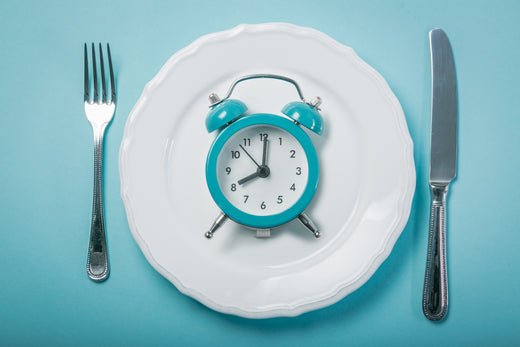When it comes to diets and health trends fasting has long been the talk of the town.
But what a lot of people don’t realise is that it is more than just about losing weight and it doesn’t have to be as hard as only consuming 600 calories in a day. And Like with any lifestyle change, to truly make the change, it needs to be sustainable and like most things, it’s about finding what works for you and your body.
After several years of fasting, my body is comfortable with long periods of fasting even 24-36 hours with only water, tea and black coffee. But more generally for me I follow a time-restricted fast where I eat for a designated 8-12 hour window and then fast for the remainder of the time. With two young boys who wake up at the crack of dawn, I am often busy and not hungry until much later in the day - but more about that later!
Whether it's 12 hours or 36, fasting can be a great tool for your body to help reset its natural digestive rhythm. By giving your body a break from the strain of digesting heavy and often processed foods it can focus on its digestive process, maintaining energy levels and rebooting your metabolism.*
The What: what is intermittent fasting
Intermittent fasting, also known as intermittent energy restriction, is the term used to encompass various meal timing schedules that cycle between voluntary fasting and non-fasting over a period of time.
To maintain a fast, it is generally accepted that you must not consumer more than 50 calories.
But this doesn’t have to be for a whole day, intermittent fasting can be as steep or as simple as a morning, or 12 hours including while you sleep!
For any fast for me, Bone Broth is always key, both nutrient dense in amino acids and protein to give you essential vitamins and help you feel fuller for longer, and at an average of 27 calories a cup it can be consumed as an all-natural way to satiate your appetite when you are keeping to restricted calories.
The Why: the benefits of IF
- Weight loss: The primary function and effectiveness of IF works through its impact on our insulin levels. Between meals, as long as we don’t snack, our insulin levels decrease and our fat cells can then release their stored sugar, to be used as energy. We lose weight if we let our insulin levels go down. The crux of IF is to lower insulin levels for a longer period of time so that we can burn more fat.
- And much, much more: An article from Harvard University revealed that flipping the switch from a feeding to a fasting state does more than help us burn calories and lose weight. Researchers from The New England Journal of Medicine looked at dozens of animal and human studies, were able to explain how simple fasting improves metabolism, lowering blood sugar; lessens inflammation, which improves a range of health issues from arthritic pain to asthma; and even helps clear out toxins and damaged cells, which lowers risk for cancer and enhances brain function.
Intermittent fasting doesn’t have to be as hard as you think:
Fasting isn’t for everyone, and while there are some more strict options new research is suggesting that you can see the same results using more reasonable, effective and sustainable structures like time-restricted fasting, especially when combined with a healthy balanced diet.
5:2: The diet that became a worldwide sensation, the diet asks that you eat a healthy and well-balanced diet for 5 days a week and for 2 days eat a very restricted number of calories i.e. 600 for women and 800 for men – not always for everyone!
Early time-restricted fasting: This for me is the best way to start. Restricted meals fit into an early eight-hour period of the day (7 am to 3 pm) or to be spread out over 12 hours (between 7 am and 7 pm) which is a lot more accessible.
This approach looks at our metabolism which has evolved to be in sync with our circadian rhythm, in which daytime is for feeding and night-time is for fasting and is better adapted to breaking down and digesting food during the day. Studies have also shown that those who followed the 7am-7pm window had a significantly decreased appetite making it less likely to binge on your next meal!
Ultimately for lifestyle and diet, it should never be a one size fits all approach and the real key to successfully making change is to follow an eating and exercise habit that works for you and is sustainable to you.
*Only try fasting on following the advice of your GP you should also make sure you are not feeling overly fatigued and that you are drinking plenty of fluids.
If you are pregnant, trying to conceive or currently suffer from amenorrhea (lack of menstrual cycle), please consult your medical practitioner before trying fasting.

Sources and further reading:
Effects of intermittent fasting on health, aging, and disease, JAMA Internal Medicine, May 2017.
Early Time-Restricted Feeding Improves Insulin Sensitivity, Blood Pressure, and Oxidative Stress Even without Weight Loss in Men with Prediabetes. Cell Metabolism, May 2018.
https://www.health.harvard.edu/blog/intermittent-fasting-surprising-update-2018062914156
Harvard Medical School, Feb 2020





